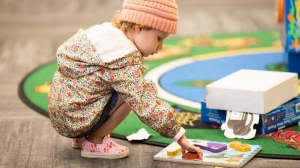Transitioning to childcare is a significant milestone in a child's life. It often involves new environments, routines, and social interactions, which can be challenging for both children and parents. Proper preparation can ease this transition, helping your child adjust more comfortably and confidently. Here are several strategies to prepare your child for the move to childcare.
1. Start Early with Gradual Introduction
Introducing the concept of childcare gradually can help your child become familiar with the idea before the big day arrives.
Talk About Childcare
Begin by discussing what childcare is and what it involves. Use simple language to explain that they will spend time in a new place with other children, engage in fun activities, and be cared for by kind adults. Highlight positive aspects like making new friends and playing with new toys.
Visit the Childcare Centre
Arrange visits to the childcare Rosebery centre before the official start date. Allow your child to explore the environment, meet the caregivers, and observe other children. These visits can make the new setting feel more familiar and less intimidating.
Practice Separation
Gradually practice separation to help your child get used to being apart from you. Begin with brief intervals and gradually extend the time. This could involve leaving your child with a trusted relative or friend for a few hours.
2. Establish a Consistent Routine
Children thrive on routines as they provide a sense of predictability and security. Establishing a consistent daily routine can help your child adjust to the childcare schedule.
Morning Routine
Develop a morning routine that mimics the schedule on childcare days. This might include waking up at the same time, having breakfast, getting dressed, and leaving the house. Practicing this routine can make the actual transition smoother.
Bedtime Routine
Ensure your child has a consistent bedtime routine to guarantee they get enough rest. A well-rested child is more likely to handle transitions and new experiences positively.
Meal and Nap Times
If possible, align your child's meal and nap times at home with those at the childcare centre. This alignment helps your child adapt to the new schedule more easily.
3. Foster Independence
Encouraging independence helps build your child's confidence and prepares them for the more structured environment of childcare.
Self-Care Skills
Teach your child basic self-care skills such as washing hands, using the toilet, and eating independently. These skills boost their confidence and reduce anxiety about managing tasks without parental assistance.
Encourage Decision-Making
Give your child opportunities to make simple choices, such as selecting their outfit or choosing a snack. This practice fosters decision-making skills and independence.
Practice Social Skills
Encourage your child to interact with other children through playdates or group activities. These interactions help develop social skills and ease the transition to a group setting at childcare.
4. Communicate Openly and Reassure
Open communication and reassurance are crucial for helping your child feel secure about the transition to childcare.
Listen to Concerns
Listen to your child's concerns and feelings about starting childcare. Reassure them that it's normal to feel anxious or excited by validating their feelings. Provide comfort by addressing any specific worries they may have.
Read Books About Childcare
Reading books about childcare can help your child understand what to expect. Look for stories that depict positive experiences and relatable characters. Discuss the stories and relate them to your child's upcoming experience.
Positive Reinforcement
Use positive reinforcement to build your child's confidence. Praise their efforts in adapting to new routines, practicing independence, and expressing their feelings. Highlight their strengths and remind them of past successes in new situations.
5. Build a Relationship with Caregivers
Establishing a positive relationship with the childcare providers can enhance your child's comfort and trust in the new environment.
Introduce the Caregivers
During visits to the childcare centre, introduce your child to their caregivers. Allow them to interact and build rapport. Familiarity with the caregivers can make the first day less daunting.
Share Information
Share relevant information about your child with the caregivers, such as their preferences, routines, and any specific needs or concerns. This information helps caregivers provide personalized care and support.
Stay Involved
Maintain open communication with the childcare staff. Regularly check in to discuss your child's progress, share observations, and address any concerns. Being involved shows your child that you trust and support the caregivers.
6. Prepare for the First Day
The first day at childcare is a significant event. Proper preparation can make it a positive experience for both you and your child.
Pack Comfort Items
Allow your child to bring a comfort item from home, such as a favorite stuffed animal or blanket. Having a familiar object can provide reassurance and comfort in the new setting.
Plan a Positive Drop-Off
Plan for a positive and calm drop-off on the first day. Keep your goodbyes brief and cheerful, reassuring your child that you will return soon. Avoid lingering, as prolonged farewells can increase anxiety.
Establish a Goodbye Ritual
Create a special goodbye ritual, such as a hug, high-five, or special phrase. This ritual can provide consistency and comfort during the transition from home to childcare.
7. Be Patient and Supportive
Adjusting to childcare takes time. Be patient and supportive as your child navigates this new experience.
Expect an Adjustment Period
Understand that it's normal for children to need an adjustment period. They may initially experience separation anxiety or resistance. Offer extra comfort and reassurance during this time.
Celebrate Milestones
Celebrate your child's milestones and progress in adapting to childcare. No matter how minor, acknowledge their efforts and accomplishments. Positive reinforcement boosts their confidence and motivation.
Provide Consistent Support
Continue to provide consistent support and encouragement. Maintain open communication with your child, listen to their experiences, and address any concerns that arise.
Guiding Your Child's Smooth Transition to Childcare
Preparing your child for the transition to childcare involves thoughtful planning, open communication, and supportive strategies. By creating a stimulating environment, fostering independence, building positive relationships, and providing consistent support, you can help your child navigate this significant milestone with confidence and ease. With patience and encouragement, your child will adapt to their new environment, forming valuable social connections and developing essential skills that contribute to their overall growth and well-being.






